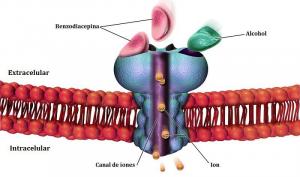The effects of testosterone on the male brain
Testosterone is a hormone that, although also present in women, appears in the collective imagination as the main substance associated with the masculine. Since its discovery it has been linked to aggressiveness, competitiveness, muscular and physical development, and sexual appetite. We know that all of this is influenced by the action of this hormone.
But... How does testosterone affect the brain? Different investigations help to know the implication of this substance in the functioning of the male nervous system.
What is testosterone?
Testosterone is a steroid-type hormone, which penetrates through the cell membrane and binds to certain proteins and passes together with them to the nucleus to be able to synthesize different proteins.
It is also one of the main sex hormones that is part of the group of androgens. It is a fundamental substance for development and is involved in a large number of processes. Among them, their great importance for sexual development stands out (both the primary and secondary sexual characteristics of men depend to a great extent on this hormone) and in
the libido or sexual appetite.But its functions are not only sexual, but it also has an effect on cognitive abilities, emotions, growth and bone and muscle building and mood.
The main organs that release testosterone are the testes, which release Leydig cells along with other hormones. This liberation is governed by the hypophysis, located in the brain. However, the testes are not the only organ that secretes testosterone. In fact, both men and women have testosterone (although the latter to a lesser extent). This is because some cells of the adrenal glands also synthesize and release it, and some ovarian cells in the case of women.
Although it is secreted naturally, in some individuals with different problems synthetic testosterone treatments can be carried out. This is the case of people with hypogonadism, some biological causes of erectile dysfunction or in the hormonal therapy they carry out people in the process of changing their sex (specifically, in those cases in which the subject seeks to reassign himself to the male sex). Patches of this hormone are also used to treat osteoporosis and decrease sexual desire. They have also been used in other areas, such as sports, although their use is considered doping.
Performance at the brain level
Testosterone is a hormone that acts at various levels and in different brain structures. Research reveals that specifically causes an increase in the activity of the limbic system at the brain level, a set of parts of the brain that participate in the creation of emotions.
In this sense they would be especially the amygdala, the hypothalamus or the periaqueductal gray matter, which are affected by testosterone, which causes it to be more reactive to stimulation. Keep in mind that these brain areas are very linked to ancestral survival mechanisms, thus activating the aggressive response as a way of guaranteeing one's own safety.
In addition, testosterone has different mechanisms of action by promoting and increasing the production of different neurotransmitters. Specifically, it has been observed that the secretion of dopamine and acetylcholine is greatly influenced by the level of testosterone.
Effects of testosterone on the brain
Testosterone has a series of effects at the brain level of great importance that in turn cause different effects on the behavior and capacities of the individual. Several are specified below.
1. Increase the level of aggressiveness and competitiveness
The action of testosterone at the level of the amygdala and the limbic system in general causes the subject to manifest a high reactivity to external stimuli, awakening aggressive reactions more easily. It has also been observed that as the concentration of this hormone increases, the level of competitiveness of the subjects tends to be higher.
2. It is linked to energy
The greater presence of testosterone in men is also associated with a higher level of energy and activity. This relationship is bidirectional: testosterone can make us more active, but at the same time the more active we are, the more testosterone we generate. This fact means that frequent exercise is recommended for people who have a low level of this hormone.
3. Boost libido
Another of the best known and most visible effects of this sex hormone is precisely the increase in libido. Both men and women. In fact, patches of this hormone are often prescribed in women who have lost their sexual appetite after menopause.
4. Has an influence on mood and anxiety
By increasing dopamine production, testosterone has an effect on maintaining mood and feelings of pleasure. Men with low testosterone levels tend to have a higher number of depressive symptoms. In the same way, they also tend to show a higher level of anxiety than subjects with normative or high levels.
5. May decrease capacity for empathy
People with excessive amounts of testosterone may be less empathetic, more self-centered, and with less ability to bond emotionally. This is associated with a possible inhibitory effect of this hormone with oxytocin.
6. Effect on memory
As with dopamine, testosterone causes an increase in acetylcholine levels. Being a hormone involved in brain function, can influence the ability to keep information in memory and later evoke it from cognitive aspects such as memory.
- You may be interested: "Types of memory: how does the human brain store memories?"
7. Promotes neurogenesis
Different investigations suggest that the presence of testosterone causes the birth and growth of new neurons, especially in the case of the hippocampus.
- Related article: "Neurogenesis: how are new neurons created?"
Bibliographic references:
- Janowsky, J.S. (2006). Thinking with your gonads: testosterone and cognition. Trends in Cognitive Sciences, 10 (2): 77–82.
- Zarrouf, F.A.; Artz, S.; Griffith, J.; Sirbu, C & Kommor, M. (2009). Testosterone and Depression: Systematic Review and Meta-Analysis. Journal of Psychiatric Practice: 15 (4): 289-305.

